Wandervögel
@serf_leeds 11/08/23 - 19/08/23
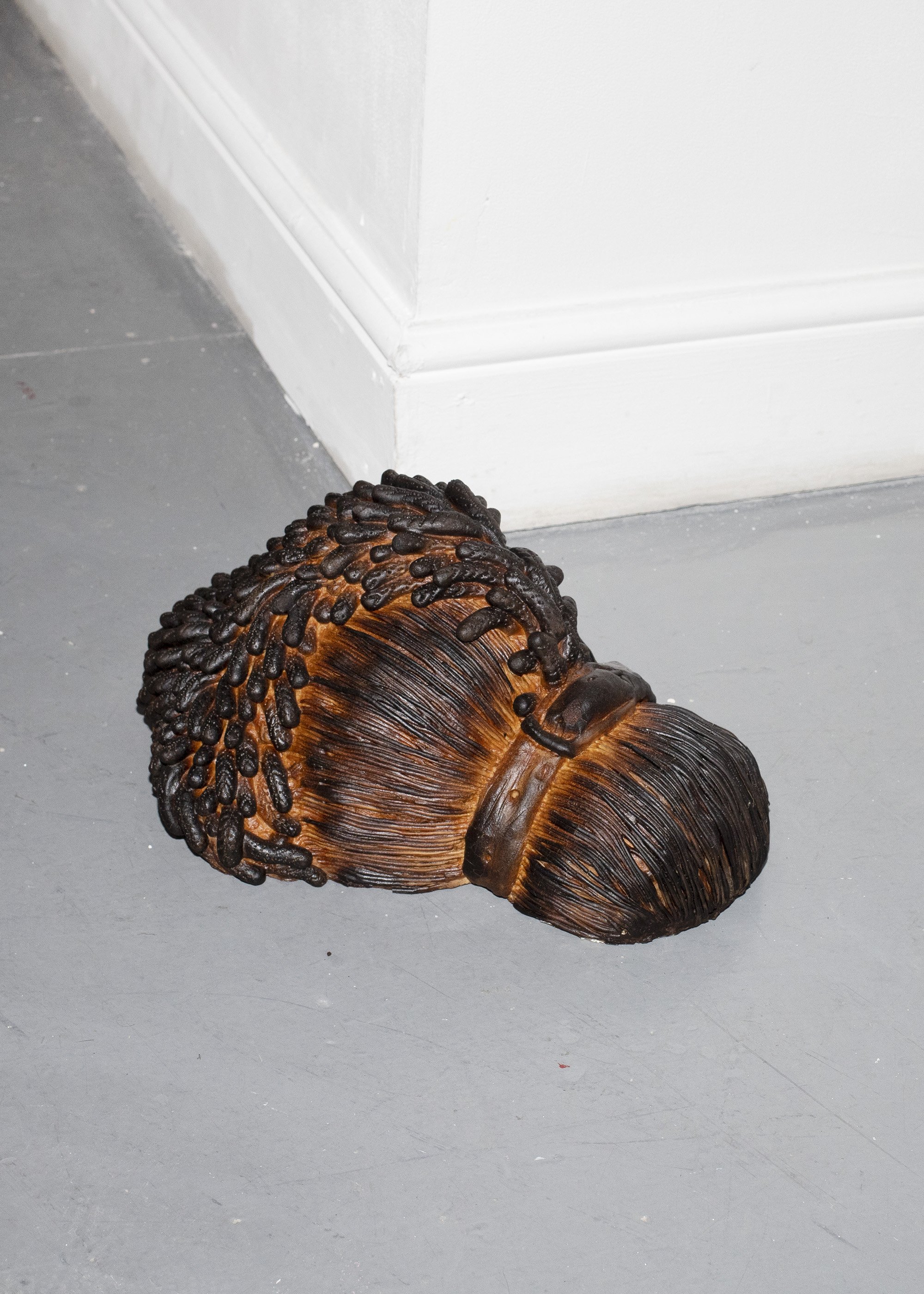



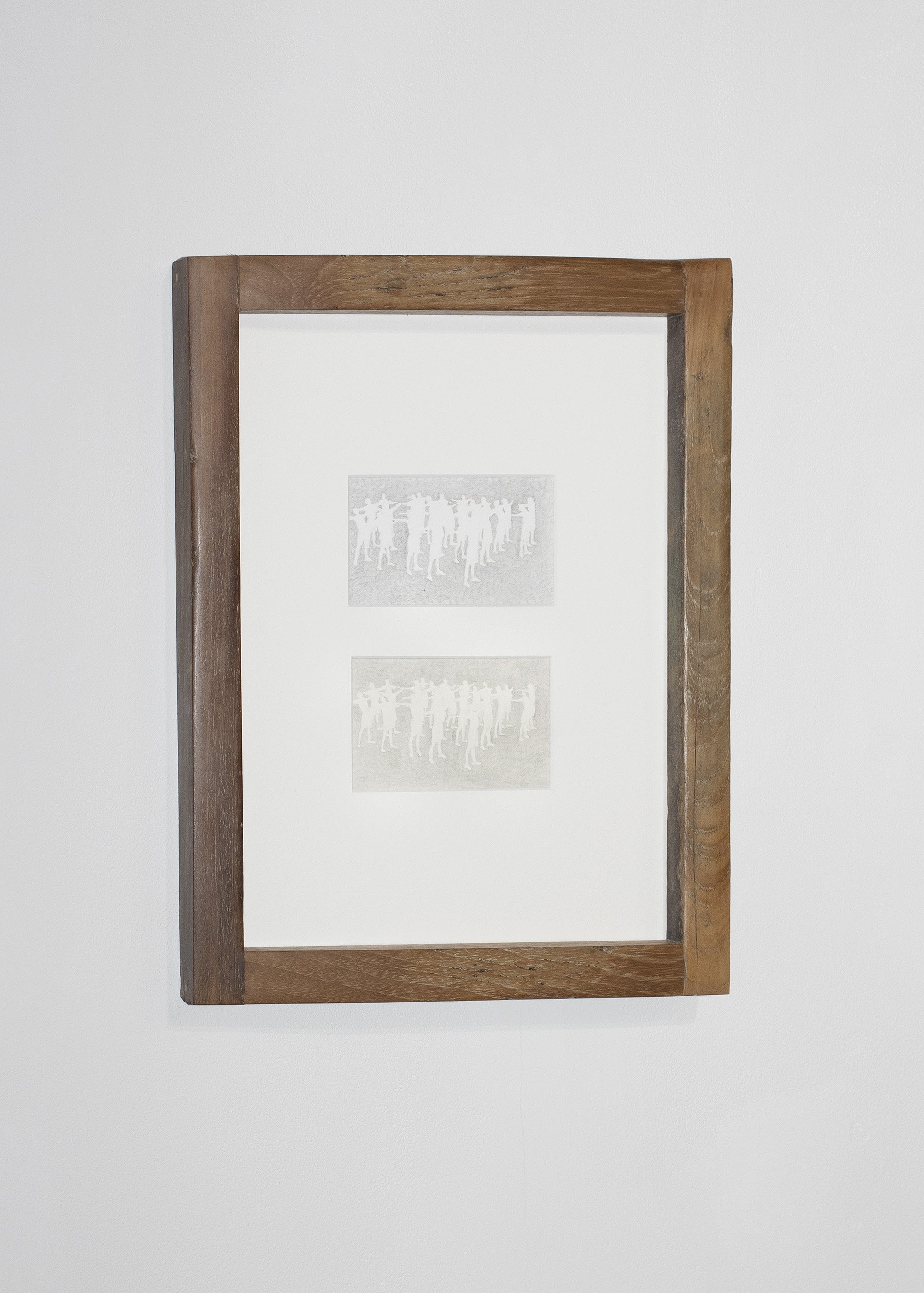

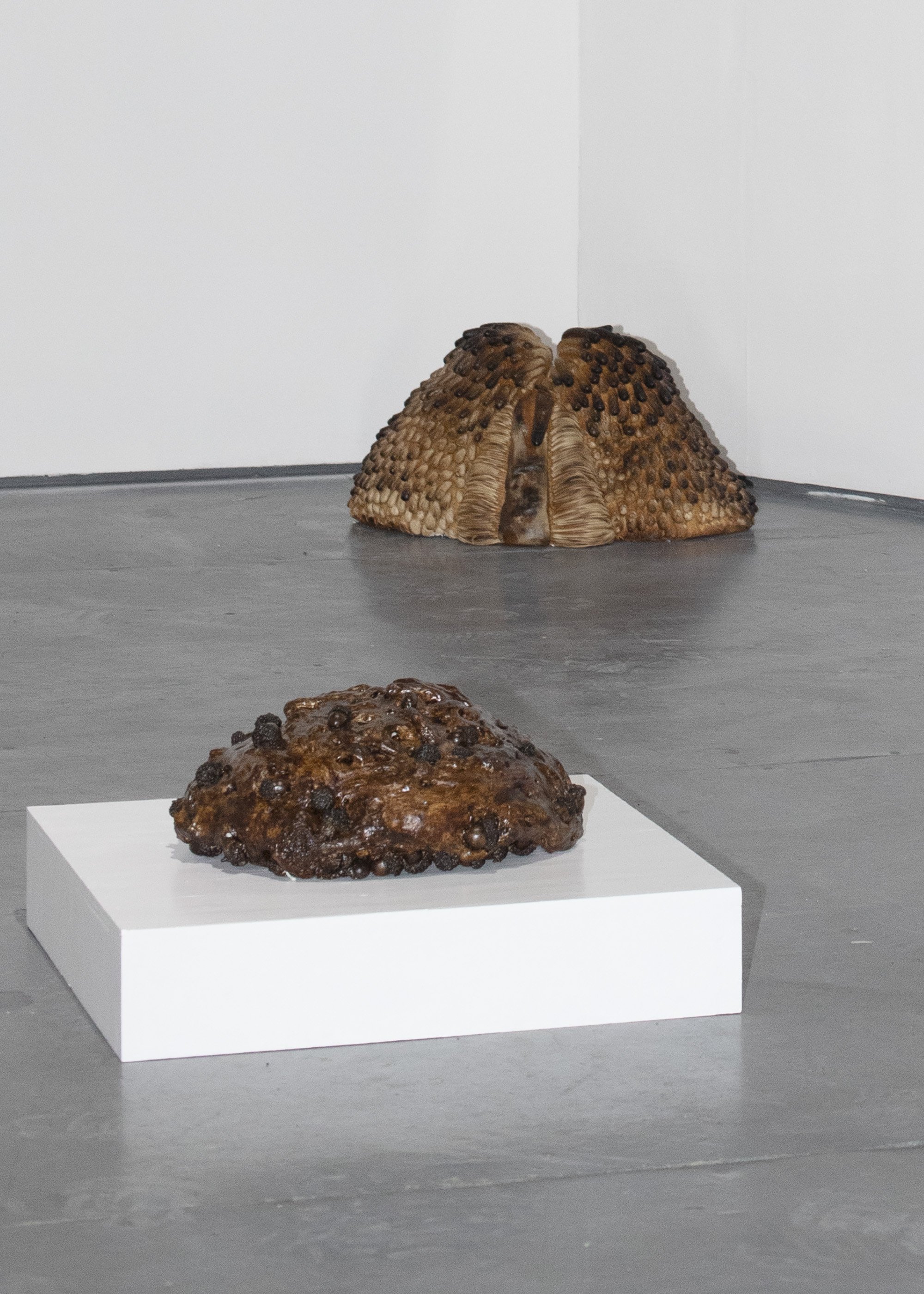
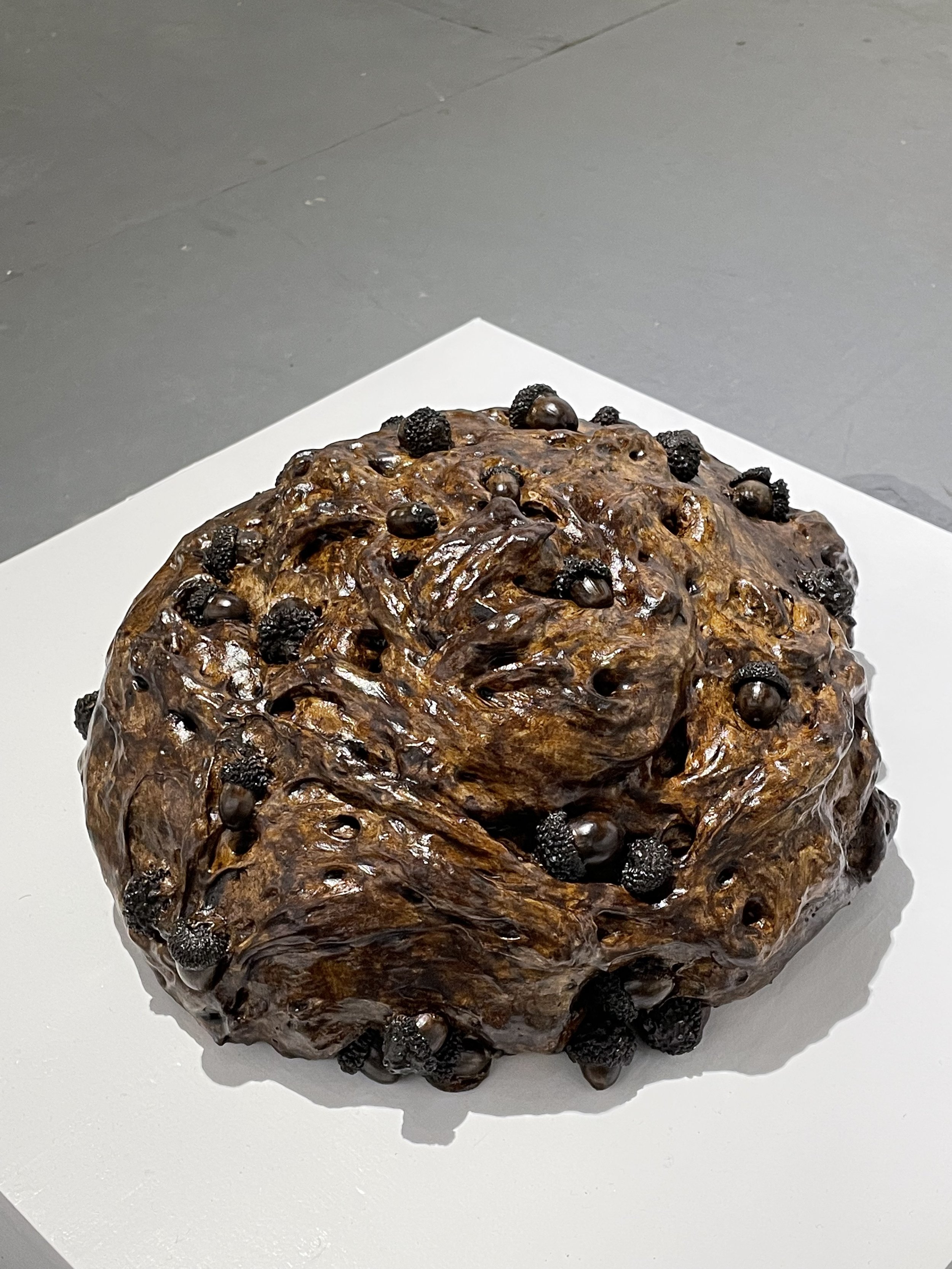

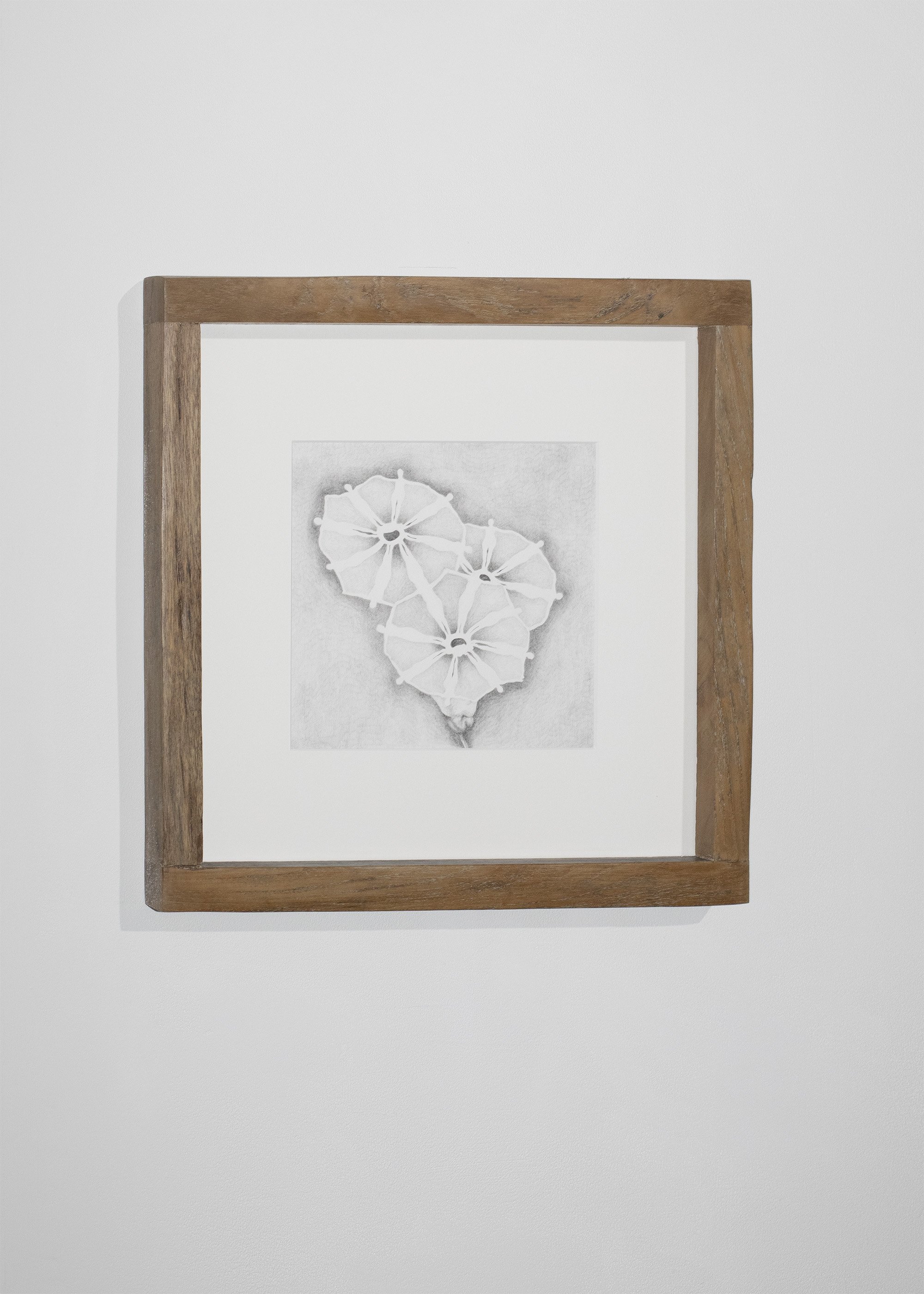





1. Positions, A, B (2023) Graphite on Paper, Artists frame: reclaimed wood from Basildon municipal bench, 33.5x42x4.5
2. Formation 1a, 1b (2023) Graphite on Paper, Artists frame: reclaimed wood from Basildon municipal bench 33.5x42x3.5
3. Formation 2a, 2b (2023) Graphite on Paper, Artists frame: reclaimed wood from Basildon municipal bench 33x42x4
4. Substitutes For Bread (2023) Salt, Flour, Glaze, dimensions variable (multiples)
5. Metamorph (2023) Graphite on Paper, Artists frame: reclaimed wood from Basildon municipal bench, 43.5x41x4
6. Formation 3 (2023) Graphite on Paper, Artists frame: reclaimed wood from Basildon municipal bench 38x35.5x4
7. Formation 4 (2023) Graphite on Paper, Artists frame: reclaimed wood from Basildon municipal bench 38x35.5x4
8. Metalepsis (2023) Graphite on Paper, Artists frame: reclaimed wood from Basildon municipal bench, 37.5x34.5x4
9. Eichwald, Or, Pastoral Wish Fulfilment (2023) Acorns, pulped copy of Sade’s last will and testament, paint, varnish, 30x26x12
10. Labels of administrative convenience ( after Lygia Clark) (2023) hunting decoys, shells, glue, 80x16x14.5
Wandervögel is the first solo show of Kelly Ballett’s work, bringing together a new body of drawings and sculptural objects. Out of teutonic roots, the term Wandervögel evokes both the wandering figures of theGermanic Romantic tradition & its populist variants of 20th century German youth groups protesting against industrialisation. Ballett’s work passes through a series of calisthenics; linguistic-muscular structures, bodily configurations, and architectural vernacular, to present Wandervögel as a vehicle or enabler - a bird of passage. The show is accompanied by a text written by Cole Denyer.
Wandervögel
Here's my advice: take some pills and purge your head; fuck a lot or work out until your arms are twenty inches thick. Finally you will be a brute, if not a visionary. Arthur Cravan I recall Ballett’s early versions of Substitutes for Bread huddled in a corner in Fitzrovia in 2021. I had just come from one of the pubs in the neighbourhood, The Wheatsheaf, at 25 Rathbone Place, which from the ghosts of London’s inter-war hang on the wall in mock-heritage; George Orwell Drank Here! Dylan Thomas Drank Here! Then the Substitutes seemed somewhat perilous to periwinkle winklepickers. In 2023, Substitutes for Bread are large mounds, rotund bellies from the floor up. They are not dotted across the floor of Serf, but strangely eruptin tumid configurations. A series of Fasces made out of salt dough, formed from variations of wheat sheafs and bundles. Passer pour of harvest offering the wheat sheafs begin to larp this pastoral idyll. Fastened in place by belts or collapsed in on themselves, some are burnt and some billow out, others appear awkward & constrained.
These works derive their title from the satirical print of James Gillrays’ ‘Substitutes for Bread;–or–Right Honorables, Saving the Loaves, & Dividing the Fishes’ (1795) depicting the greed of the ruling classes in Georgian Britain, and inequalities of the distribution of wealth. Ministers sit at a round dinner-table guzzling guineas, while through the window is seen a hungry mob. On the wall are placards:
'Proclamation for a General Fast, in order to avert the impending Famine and Substitutes for Bread Venison, Roast Beef, Poultry, Turtle Soup, Fish, boiled in Wine, Ragouts, Jellies &c. Burgundy, Champaign, Tokay, &c, &c.'. Outside the feast two placards can be seen: 'Petition from the Starving Swine' and 'Grant us the Crumbs which drop from your Table'. Beneath the title: 'To the Charitable Committee, for reducing the high price of Corn, by providing Substitutes for Bread in their own Families, thisrepresentation of the Hard Shifts made by the Framers & Signers of the Philanthropic Agreement, is most respectfully dedicated.'
Charitable Committee, was the title of Balletts’ last solo show, inside a semi-public toilet space in the City of London, Moorgate at scatological rites of all nations in 2021. The City of London sits altogether outside the remit of London & is itself run by the private company the City of London Corporation. It has a private police force and private courts, & there are four veneers of elected representatives at its core; common councilmen, aldermen, sheriffs & the Lord Mayor. Still today, CLC is exempt from numerous laws that function in the rest of Britain, with its political system deriving from the Middle Ages & its Lord Mayor selected from Medieval Guilds. It is, something like a doubling of the dynamics of Gillrays’ satire, where right honorables sit around the table dividing the guineas with their backs turned to the poor as they starve within view from the outside.
The price of bread within the United Kingdom government austerity programme has proven both a barometer of political violence. Cast first as simple ignorance and second as the figurative function of the breadline and its analogous worsening and deprecation of livability in the UK. If we are now hardly able to afford bread, how are we to find the roses? David Cameron famously struggled to find the answer, claiming rather he used an electric bread maker. Touche alongside a 25k pumped up garden shed to write in. At that time in 2013 the average price was bread 47p, it is now £1.37. The drawings present a series of group exercises such as calisthenics and
synchronised swimming, they are titled as Formation 1, 2, 3, etc. They are all presented in teak frames that have been constructed by the artist from reclaimed wood from a single Basildon municipal bench, a remnant of the New Towns Act of 1946 national policy that set about reconfiguring civic spaces inspired in part by the philanthropic and commercial project of the Garden cities in post-war Britain. With the founding of Development Corporations, the newly labeled New Towns was something like the merging of untapped Greenfield sites with Ebenezer Howard's joyous union. As is within the inlay of Garden Cities of To-morrow: A Peaceful Path to Real Reform the poem ‘The Present Crisis’ by J.R. Lowell:
New occasions teach new duties ;
Time makes ancient good uncouth ;
They must upward still, and onward,
"Who would keep abreast of Truth.
Lo, before us, gleam her camp-fires ! "
We ourselves must Pilgrims be,
Launch our ' Mayflower,' and steer boldly
Through the desperate winter sea,
Nor attempt the Future's portal
With the Past's blood-rusted key.
Sat on a low plinth, is Eichwald or Pastoral Wish Fulfillment (2023) a replica cowpat with acorns dotted all around & a pulped copy of Sade’s last will and testament somewhere hidden. The piece looks almost like a wood carving from black Walnut, its deceptive & guileful all the while harnessing this ‘pulped’ secret; the contents Sade’s testament composed in 1806:
The trench, my grave, once covered over, shall then have acorns strewn over it, in order that the spot become green again, and the copse grown back thick over it, so that any trace of my grave will disappear from the face of the earth, just as I trust the memory of me will fade from the minds of everyone, save for the few who in their goodness have loved me to the last, and of whom I carry a sweet remembrance with me to the grave.
The substitution of the earth, with a mound of cow shit disinterns Sade’slast ‘rational’ testament back to his literary discontents. As Sade writes, ‘the memory of me will fade from the minds of everyone,’ yet the infamous 120 Days of Sodom, saved no less 2 days before the Storming of the Bastille in 1789 by a young man called Arnoux de Saint-Maximin, who then sold it to a Provençal aristocrat, the Marquis de Villeneuve-Trans. His family held on to it for more than a 100 years before eventually selling it to a German collector, who allowed the pioneering sexologist Iwan Bloch to publish the novel for the first time in 1904. It's no surprise that the ur-text of sadism contains the word shit over 100 times in the 400 page 120 Days of Sodom and is inextricably a tool of both the Libertines' pleasure & debasement.
Shit, my little one, shit away, my angel [...] show me the turd coming forth out of your lovely ass.
One of the many stories-within-a-story, tells of a man who made two unusual requests before intimate encounters, which he premeditated by a week: those he slept with were required to soak three cat-o-nine tail whips in a bucket of shit and piss, & prohibited from bathing for an entire week prior to the engagement. When the man arrived for his encounter, he went about sniffing all his partner's unwashed holes, then licked them clean, between bouts of being whipped rotten with the soaked whips. The encounter climaxes:
I unleashed my turd. It shot squarely into his face, he fell back, exclaimed that I was an insolent creature, and discharged while frigging himself [...] he had received at least two hundred lashes.
Ballett’s work has at its animus the sites/holes of repressive and sexual pleasure; shit in both humiliation and wish fulfillments, cruelty & festivityas the scars of sovereign vengeance multiply across the body. This new reality is that of the anal universe, a universe of sacrilege, where ‘all that is taboo, forbidden or sacred is devoured by the digestive tract, an enormous machine disintegrating the molecules of the mass thus obtained in order to reduce it to excrement’.
Eichwald, I find out later, is the imaginary village in Michael Haneke’s 2009 The White Ribbon, in the Protestant North of Eastern Germany sometime in the early 20th Century. In this imaginary location, no one has names but are seemingly just functionaries of a hollowed out class/profession: the Baron, the Steward, the Midwife, etc. It is entirely detached, a companion to the Libertines palace in the Black Forest, wherein the limitless enjoyment of cruelty takes place. Another element of the title is that of the Pastoral wish fulfillment. Here again, Ballet’s work functions to turn the work into the complex web of both projections, hallucinations & fantasies. As Freud writes in The Interpretation of Dreams:
Dreams are not to be likened to the unregulated sounds[…]they are not meaningless, they are not absurd; they do not imply that one portion of our store of ideas [...] they are the psychical phenomena of complete validity-the fulfillment of wishes.
The pastoral wish fulfillment of Ballett’s work here is something of a sardonic hangover, embedded in Eichwald’s anonymous, retaliatory malice is the inedible bitterness of Sade’s last act, to commit omertà (conspiracy of silence). His last testament was disregarded and he was given a religious service; eventually his skull was removed for phrenological study, observed to have no ‘ferocity’ & ‘excess in erotic impulses’, & you can now purchase a Bronze cast from a distant relative Count Hugues de Sade.
Ballett’s work throughout Wandervögel from the cartouches of moonflowers to metastasizing wheat sheafs are fraught with a disjuncture that strangely encodes at the surface what is hidden in plain sight. As the narrator's first words from The White Ribbon rings back; 'I'm not sure whether what I am about to tell you is faithful to the truth. Much of it I've forgotten, and much of it relies on hearsay’.
